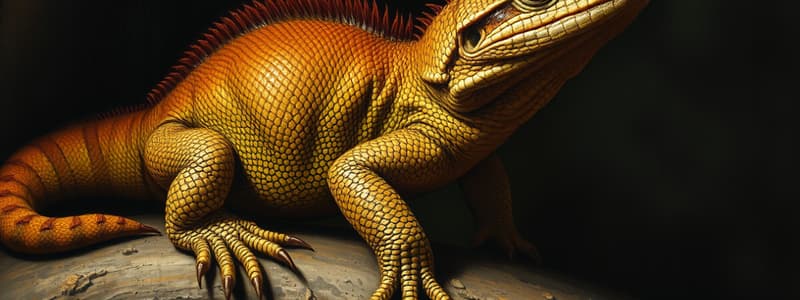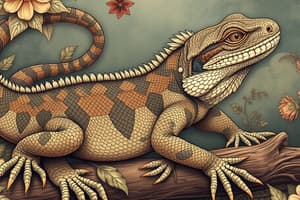Podcast
Questions and Answers
Which order do turtles belong to?
Which order do turtles belong to?
- Order Sphenodontida
- Order Testudines (correct)
- Order Squamata
- Order Crocidylia
Which order includes crocodiles and alligators?
Which order includes crocodiles and alligators?
- Order Crocidylia (correct)
- Order Squamata
- Order Sphenodontida
- Order Testudines
Which order does the tuatara belong to?
Which order does the tuatara belong to?
- Order Squamata
- Order Sphenodontida (correct)
- Order Testudines
- Order Crocidylia
Which suborder do lizards belong to?
Which suborder do lizards belong to?
Which suborder do snakes belong to?
Which suborder do snakes belong to?
What type of skull has no openings and is associated with turtles?
What type of skull has no openings and is associated with turtles?
What type of skull has one opening and is a precursor to mammals?
What type of skull has one opening and is a precursor to mammals?
What type of skull has two openings and led to crocodilians, lizards, birds, and dinosaurs?
What type of skull has two openings and led to crocodilians, lizards, birds, and dinosaurs?
Ectothermic animals use internal processes to control their body temperature.
Ectothermic animals use internal processes to control their body temperature.
What structure allows breathing while swallowing?
What structure allows breathing while swallowing?
What is the dorsal shell of a turtle called?
What is the dorsal shell of a turtle called?
What is the ventral shell of a turtle called?
What is the ventral shell of a turtle called?
What protein makes up reptile scales?
What protein makes up reptile scales?
Ecdysis refers to reptiles shedding skin to grow.
Ecdysis refers to reptiles shedding skin to grow.
What is an individual unit of a turtle shell called?
What is an individual unit of a turtle shell called?
Turtles are the most endangered group of reptiles.
Turtles are the most endangered group of reptiles.
What does yolk provide in eggs?
What does yolk provide in eggs?
What does albumen provide in eggs?
What does albumen provide in eggs?
What structure cushions the embryo in egg development?
What structure cushions the embryo in egg development?
What is the purpose of the shell in reptile eggs?
What is the purpose of the shell in reptile eggs?
What role does the chorion play in reproduction?
What role does the chorion play in reproduction?
What is the function of the allantois in egg development?
What is the function of the allantois in egg development?
In reptiles, what are venom glands modified from?
In reptiles, what are venom glands modified from?
How do sea turtles navigate?
How do sea turtles navigate?
Which order is the only group of reptiles that can vocalize?
Which order is the only group of reptiles that can vocalize?
What type of teeth are found in worm lizards?
What type of teeth are found in worm lizards?
Snake jaws move independently of each other.
Snake jaws move independently of each other.
Flashcards are hidden until you start studying
Study Notes
Reptile Classification and Anatomy
- Testudines refers to turtles, characterized by a hard shell.
- Crocodylia encompasses crocodiles and alligators, featuring strong jaws for capturing prey.
- Sphenodontida includes tuatara, a unique reptile native to New Zealand.
- Squamata is divided into two suborders: Sauria for lizards and Serpentes for snakes.
- Anapsid skull structure, lacking openings, is observed in turtles.
- Synapsid skulls have one opening that led to the evolution of mammals.
- Diapsid skulls possess two openings, giving rise to diverse groups including crocodiles, lizards, birds, and dinosaurs.
Physiology and Adaptations
- Ectothermic animals rely on external heat sources to regulate their body temperature.
- The secondary palate allows reptiles to breathe while consuming food.
- The carapace and plastron serve as the upper and lower sections of a turtle's shell, respectively.
- Reptile scales are composed of keratin, a robust protein.
- Ecdysis is the process of shedding skin, essential for growth in reptiles.
Reproductive Adaptations
- Turtles are among the most endangered reptiles due to habitat loss and environmental changes.
- Yolk provides essential nutrition for developing embryos.
- Albumen supplies moisture to the egg, crucial for embryo survival.
- The amnion offers cushioning for the embryo, protecting it during development.
- The shell prevents desiccation, critical for egg viability in terrestrial environments.
- Chorion facilitates gas exchange, allowing oxygen to reach the embryo.
- Allantois serves to store waste produced by the developing embryo.
Unique Characteristics
- Individual units of a turtle shell are called scutes, providing structural integrity.
- Snake jaws have the unique ability to move independently, aiding in consuming prey.
- Crocodylia is the only reptilian order capable of vocalization, allowing communication.
- Nipper teeth characterize worm lizards, adapting them for their specific feeding strategies.
- Venom glands in some reptiles have evolved from modified salivary glands.
- Sea turtles navigate using the magnetic field of the Earth, showcasing their incredible sensory capabilities.
Studying That Suits You
Use AI to generate personalized quizzes and flashcards to suit your learning preferences.




